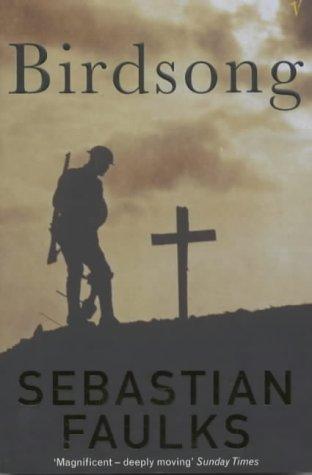This book is about the First World War from the point of view of the men in the trenches. The book begins with Stephen, a young Englishman, in France on a business trip in 1910, staying at the house of a wealthy factory owner. Stephen falls in love with the beautiful young wife of his host, Isabelle and a passionate affair is followed by a very intense love-story. The action then jumps to the trenches of the Somme in 1914 with Stephen seeing action as an Officer in the British army and surrounded by a varied cast of Englishman from the innocent Officer Wier to the jack-the-lad “sewer-rat” tunneller, Jack Firebrace.
The book is a real no holds-barred account of the First World War. The stench of the trenches, the claustrophobia of the tunnels, the bodies infested with lice, the horrendous injuries and suffering described in detail; this book is not for the faint hearted or for those who have a weak stomach. What stood out the most though was the author’s effectiveness in really showing the futility of the carnage. Faulk’s describes the men “going over the top” as they walk to their deaths, waves of young men, one after another falling under gunfire on no-man’s land for no gain or benefit to anyone. He also shows very well, the disillusionment of the soldiers and their disappointment at their families back home, who are unable to understand what they have suffered and often don’t want to know.
The story jumps between the trenches of 1914-18 and London in the 1970’s where a young woman, Elizabeth, is struggling to balance modern life at the same time as trying to translate the diaries of her late grandfather, Stephen. One thing that confused me was the way that there is a love story that seems to conclude and then suddenly a war novel begins. I wondered why Faulk’s had almost put two novels in one book. Was this to provide a back story and human face to Stephen? Or was this something to be picked up again later? Eventually it all becomes clear and the significance of the love story becomes apparent. I also found that whilst I was very much caught up in the events of 1910 and 1914-18, the parts of the novel set in the 1970’s were not as engrossing and I longed to go back to Stephen’s story with the exception of Elizabeth’s poignant meeting with the old soldier.
Even so, so many passages of the book were heart-rending:
"I do not know what I have done to live in this existence.
I do not know what any of us did to tilt the wold into this unnatural orbit. We came here only for a few months.
No child or future generation will ever know what this was like. They will never understand.
When it is over we will go quietly amongst the living. We will not tell them.
We will talk and sleep and go about our business like human beings.
We will seal what we have seen in the silence of our hearts and no words will reach us." p.422
The final scene of the war between Stephen and the German Officer left me with tears in my eyes and the accounts of what happened to soldiers after the war were very painful to read. On the back of the book a few of the reviewers say that they finished the book and wanted to go back to the start again. I wasn’t convinced, but at the end of the book, I wanted to do the same.
































Looks like an emotional book. I should get a copy and do a review!
ReplyDeleteThanks
Matt